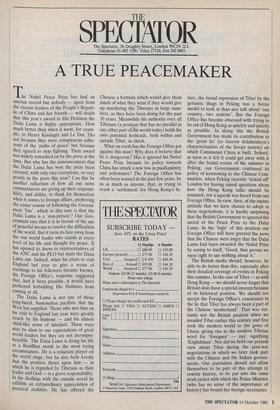The Spectator, 56 Doughty Street, London WC1N 2LL Telephone 01-405
1706; Telex 27124; Fax 242 0603
A TRUE PEACEMAKER
The Nobel Peace Prize has had an uneven record but nobody — apart from the vicious leaders of the People's Repub- lic of China and her friends — will doubt that this year's award to His Holiness the Dalai Lama is highly appropriate. How much better than when it went, for exam- ple, to Henry Kissinger and Le Duc Tho not because they were conspicuous adhe- rents of the 'paths of peace' but because they agreed to stop fighting. Their award was widely remarked on by the press at the time. But why has the announcement that the Dalai Lama has won the prize been covered, with only rare exceptions, so very poorly in the press this year? Can this be another reflection of how all our news commentators are giving up their responsi- bility, and ability, to think for themselves when it comes to foreign affairs, preferring the easier course of following the Govern- ment 'line', which in this case is that the Dalai Lama is a 'non-person'? Our Gov- ernment says that it is in favour of the use of peaceful means to resolve the difficulties of the world. But it turns its face away from the one world leader who stands at every level of his life and thought for peace. It has opened its doors to representatives of the ANC and the PLO but shuts the Dalai Lama out. Indeed, when his plans to visit England last year to give a series of teachings to his folloWers became known, the Foreign Office's response suggested that, had it been possible, it would have preferred forbidding His Holiness from coming at all.
The Dalai Lama is not one of those long-faced, humourless pacifists that the West has supplied. Those who met him on his visit to England last year were greatly struck by his humour — and his almost child-like sense of mischief. These ways may be alien to our expectations of great world leaders but they are not incompre- hensible. The Dalai Lama is living his life as a Buddhist monk in the most trying circumstances. He is a reluctant player on the world stage; but he also feels keenly that the position thrust upon him — in which he is regarded by Tibetans as their leader and God — is a grave responsibility. In his dealings with the outside world he exhibits an extraordinary appreciation of practical realities. He has offered the Chinese a formula which would give them much of what they want if they would give up murdering the Tibetans in large num- bers, as they hive been doing for the past 30 years. Meanwhile his authority over all Tibetans (a position that has no parallel in any other part of the world today) holds his own potential hotheads, both within and outside Tibet, in check.
What on earth has the Foreign Office got against this man? Why does it believe that he is dangerous? lias it ignored his Nobel Peace Prize because its policy towards China has struck a new low in pusillanimity and yellowness? The Foreign Office has often been warned id the past few years, by us as much as anyone, that, in trying to reach a 'settlement'. for Hong Kong's fu- ture, the brutal repression of Tibet by the geriatric thugs in Peking was a better model to look at than airy talk about 'one country, two systems'. But the Foreign Office has become obsessed with trying to be rid of Hong Kong as quickly and quietly as possible. In doing this the British Government has made its contribution to the 'great lie' (to borrow Solzhenitsyn's characterisation of the Soviet system) on which Communist China is built. Indeed, as soon as it felt it could get away with it after the brutal events of the summer in Peking, our Government continued its policy of kowtowing to the Chinese Com- munists: when Peking recently 'ticked off London for having raised questions about how the Hong Kong talks should be resumed, not a squeak was heard from our Foreign Office. In view, then, of the supine attitude that we have chosen to adopt in these negotiations, it is hardly surprising that the British Government to ignored the award of the Peace Prize to the Dalai Lama. In the 'logic' of this position our Foreign Office will have greeted the news that the Chinese were angry that the Dalai Lama had been awarded the Nobel Prize by saying to itself, 'Good, that proves we were right to say nothing about it.'
The British media should, however, be able to do better than this, especially after their detailed coverage of events in Peking this summer. In the case of Tibet — as with Hong Kong — we should never forget that Britain does have a special interest because of its historical position. We should not accept the Foreign Office's connivance in the lie that Tibet has always been a part of the Chinese 'motherland'. That was cer- tainly not the British position when we invaded Tibet earlier this century and first took the modern world to the gates of Lhasa, giving rise to the modern Tibetan word for 'foreigner' — inje, signifying 'Englishman'. Nor did we hold our present view about Tibet during the post-war negotiations in which we later took part with the Chinese and the Indian govern- ments. Our journalists should not allow themselves to be part of this attempt to rewrite history, to be put into the same strait-jacket with which the Prime Minister (who has no sense of the importance of history) has bound her foreign secretaries.


























































 Previous page
Previous page